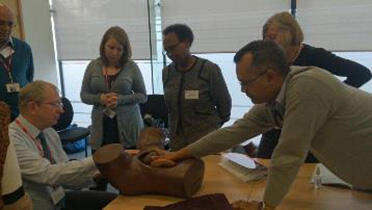
Training has got underway at the Centre for Maternal and Newborn Health (CMNH) this year with two courses being run this February.
The UK Emergency Obstetric Care (EOC) Course was run at LSTM at the start of February and is aimed at maternal and newborn health professionals from the UK who want to work in developing countries. It was made up of professionals such as midwives, obstetricians, gynaecologists, and was carried out as a three day ‘skills and drills’ training package, teaching participants how to address obstetric complications when they arise in resource-poor settings.
The training was delivered using a mixture of interactive techniques including lectures, scenario teaching, skills teaching, demonstrations and workshops. The participants work with specially trained facilitators and are encouraged to exchange examples of good clinical practice, learning from each other as well as the facilitators.
February has also seen a New Facilitators’ Orientation Workshop train a further 16 volunteers who have been selected to facilitate Emergency Obstetric Care and Newborn Care (EOC&NC) course in developing countries.
The course covers everything that the volunteers will need to know before travelling including country contexts; how the training works; care of equipment used; teaching skills; and the types of support all volunteers receive from CMNH before, during and after the in-country training. It also gives the volunteers, who are selected based on their professional medical background and qualifications, the confidence that they will need to pass on their skills to those working in resource-poor settings every day.
The facilitators are now preparing to travel to places like Ghana, Tanzania and Pakistan over the next few months to take part in the Making it Happen programme.
Dr Charles Ameh, Deputy Head of CMNH, said “Each year, Almost 300,00 women worldwide die from complications of pregnancy and childbirth – that is one every minute. To reduce maternal mortality it is important that all women have access to maternal health care services, particularly skilled attendance at birth and timely access essential obstetric care when an obstetric complication occurs. These volunteers are now equipped with all the skills they need to pass on to in-country health workers to help reduce the risk faced by millions of mothers and their babies.”